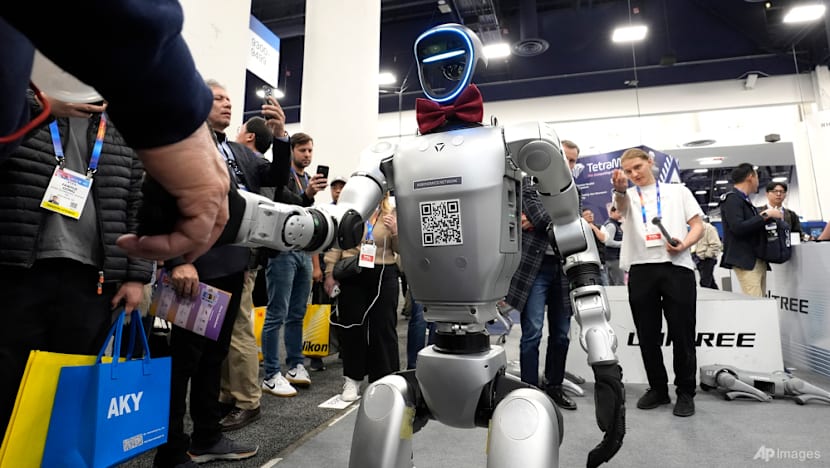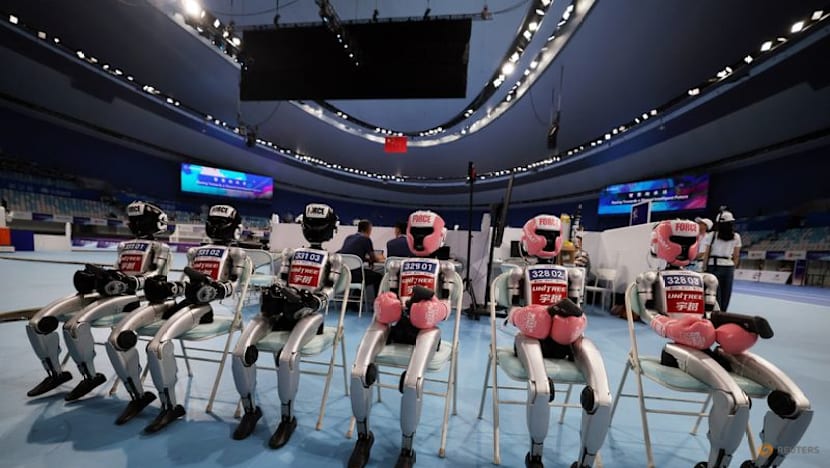China's robotics boom: Unitree’s IPO plan signals Beijing’s next tech investment frenzy
The Hangzhou-based robotics startup is reportedly preparing an initial public offering that could value it at up to 50 billion yuan (US$7 billion).

A Unitree H1 robot shakes the hand of an attendee at the CES tech show Wednesday, Jan. 8, 2025, in Las Vegas. (AP Photo/Abbie Parr)

This audio is generated by an AI tool.
SINGAPORE: China’s stock market has found its latest obsession – robotics.
One of the most eagerly awaited listings is Hangzhou-based Unitree Robotics, a rapidly growing startup best known for its humanoid and four-legged robots.
The company is reportedly preparing an initial public offering on Shanghai's tech-focused STAR Market that could value it at up to 50 billion yuan (US$7 billion), underscoring how investor enthusiasm for automation and emerging technologies is reshaping China’s equity landscape.
If achieved, that valuation would make it one of the largest IPOs globally this year.
Unitree is expecting to submit the listing application documents this quarter.
MARKET ENTHUSIASM
The biggest listing so far in 2025 came from Chinese battery giant CATL, which raised US$5.2 billion from its Hong Kong IPO in May.
The company generated US$50 billion in revenue in 2024.
By contrast, Unitree founder Wang Xingxing said in June that his firm’s annual revenue has surpassed US$140 million – a fraction of CATL’s.
Chen Jiahe, chief investment officer at Novem Arcae Technologies, added that while China’s tech firms have strong growth potential, the current wave of startups is “too crowded”.
But investor appetite remains undeterred.
Wang was among a select group of top Chinese business leaders – including some of tech’s biggest names like Alibaba founder Jack Ma – who attended a rare meeting with President Xi Jinping in February, amid intensifying competition with the United States over advanced technologies.
Few outside China took notice at the time, but the meeting instantly raised Wang’s profile – the 35-year-old was the youngest tech executive present.
The gathering was widely seen as a signal that robotics has captured the attention of China’s top leadership.
In China, such gestures often foreshadow where the next wave of state support may flow, said observers.
“The tech industry, like other sectors that are closely tied to China’s broader economic development, will likely get long-term, all-around policy support,” said Shen Meng, a director of investment bank Chanson & Co.
Chinese companies such as Unitree and AI startup DeepSeek, which demonstrate global competitiveness and influence, “are exactly the kind of firms the financial and capital markets are expected to back”, he added.
“This is because one such company can drive and grow an entire supply chain around it.”
FAST-RISING TECH SECTOR
Observers said Wang is known for his focus on cutting costs to make his robots more affordable and accelerate their adoption.
He reportedly scrutinises every aspect of production – down to individual components – to reduce expenses.
But doubts remain about their practical usefulness beyond novelty appeal.

Meanwhile, analysts are warning of a potential bubble forming in China’s fast-rising tech sector.
Hong Hao, chief investment officer and managing partner at Lotus Asset Management, noted that Unitree and other Chinese firms have developed low-cost yet efficient robot designs, saying these are “robots that on the surface look as good as many of the US competitors”.
But he added that the true sophistication of a robot lies in its so-called “brain” – its ability to see, hear and think independently.
Unitree’s robots display impressive agility and complex movements; but without advanced intelligence, they remain far from replacing human capability, he said.



















